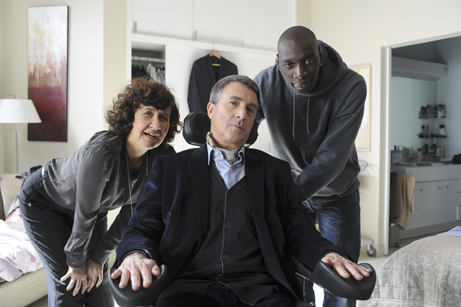
Left to right, Anne Le Ny, François Cluzet, and Omar Sy (The Weinstein Company)
By the midway point of the French buddy comedy The Intouchables, you’ll wearily throw in the towel, and the take-no-prisoners performance of Omar Sy will win you over against your better judgment. This holds true, though you might be concerned that his character, Driss, will cause bodily harm to Philippe, his quadriplegic boss. You might also grimace as he recklessly joyrides though Paris traffic (with the police in pursuit), or when he cluelessly damages a 200-year-old painting. Whether it’s wanted or not, Driss voices his opinion. If he finds something amusing (say, German opera), everyone better laugh, too. He never gives up his shtick, whether playing the fool or going with the flow. Yes, he’ll make you laugh, and sometimes cringe.
The film has racked up over 20 million tickets in France alone last year—its success overshadows its merits and has taken on a life of its own, á la My Big Fat Greek Wedding. Because the directors and their cast seek nothing more than to entertain, anyone trying to find a deeper layer of what the film portends for French cinema will probably come up blank.
The storyline follows the formula where opposites forge a friendship, here between a loaded white aristocrat and a Senegalese immigrant from the projects with a prison record—it’s a status quo Trading Places. For Driss, Berlioz is the name of the housing project, rather than the composer of the opera Les Troyens. (Philippe listens to nothing written after the mid-1800s.) Out of all the applicants for the position of Philippe’s (very) personal live-in assistant, Driss is the only one who doesn’t speak job-seeker lingo. He just wants Philippe to sign his government assistance form. He’s so full of swagger and self-love that he doesn’t have an ounce of pity—and that’s just what Philippe, who hires him for a trial period, wants.
Driss becomes the archetypal “Other,” who airs out the arid and ornate palatial manse, a holdover from the Ancien Régime. Besides dressing and bathing Philippe, Driss eventually takes on the duty of a father confessor, family counselor, and wingman—cue the montage of hookers and smoking pot. The pace zips from one comic setup to the next, but not fast enough to banish discomforting stereotypes: Driss steals a Fabergé egg within the first few minutes of his arrival in Philippe’s home. In a later scene that’s somewhat painful to watch, he interrupts a Vivaldi concerto, puts on the campy disco classic “Boogie Wonderland,” and begins shaking his hips on the dance floor, much to the delight and entertainment of the stuffed shirts. He teaches the white folk to loosen up while acting the smiling buffoon.
Because Driss sucks all of the oxygen on screen, it may be too easy to overlook the masterful performance by François Cluzet as Philippe. He’s the balancing understatement to Sy’s showboating, though the latter won a Best Actor César, France’s Oscar, for this role, beating out Jean Dujardin of The Artist. Talk about splitting hairs. Both are charming, effortless, and have an old-school showbiz sensibility (though in The Intouchables, maybe a bit too old-fashioned, think 1930s domestics-as-comic relief). However, Dujardin’s performance is more vulnerable, and he eventually drops his comedic mask. Both characters would make fun blind dates, but you can be assured that Dujardin’s wouldn’t lose your number.

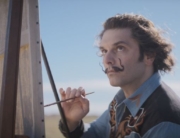
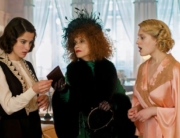

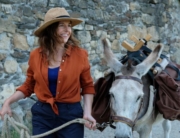
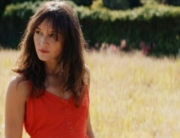
Leave A Comment